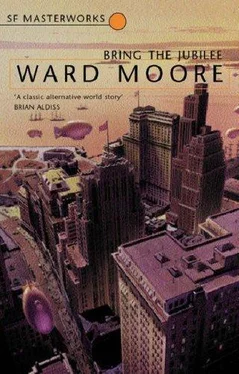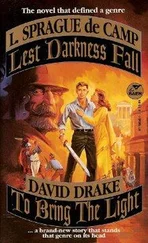Ward Moore
BRING THE JUBILEE

Science Fiction Masterworks Volume 42
For Tony Boucher and Mick McComas who liked this story
What he will he does, and does so much
That proof is call'd impossibility.
TROILUS AND CRESSIDA
It is always the puzzle of the nature of time that brings our thoughts to a standstill. And if time is so fundamental that an understanding of its true nature is for ever beyond our reach, then so also in all probability is a decision in the age-long controversy between determination and free will.
—
The Mysterious Universe By James Jeans
It is a never-ending source of entertaining discussion among those who are fascinated by the great events of history: “What if… ?” Throughout time, and the great events of Man, it has often been said that what has occurred was determined by the Fates. Or perhaps each decision that resulted in some great achievement, heroic and everlasting, in fact hinged on plain dumb luck.
Students of the Civil War often notice these peculiar and intriguing occurrences more readily than the historians from whom they learn, possibly because it is the job of the historian to ignore the “what if” and focus instead on what was . And often, the more endearing charms of history are pushed aside by these very students, in pursuit of a higher test score.
There have been countless debates on the outcome of significant events: What if… Stonewall Jackson had lived? Would his presence at Gettysburg have turned the tide in Lee's favor? Even those who were there at the time felt his absence. What of the “lost orders” of Lee, found by chance by scavenging Federal soldiers, who surely valued the cigars around which the papers were wrapped more than the papers themselves? Yet, at least one of them had the wisdom to show the papers to an officer, who in turn went to General McClellan. Thus was the Battle of Antietam fought at all.
But these are documented, discussed, and debated because the events were monumental, the results clear and defined. For each of these, how many were never discovered at all, never noticed in the mundane day-to-day lives of the anonymous soldiers and civilians? Even those, the insignificant events that no one ever sees, determine history. There is no sense of fate, or even luck, for the character who lives in the time, or perhaps well after the time; who exists in a world that has been made for him, in circumstances decided by others, and by events of long ago. That person simply lives in the world around him, absorbing what is there, what courses are open to him, what opportunities there may, or may not, be. For him or her, dwelling on what might have been is an exercise in frustration, because what is was decided long ago, by events long forgotten, or long misunderstood.
Hodgins McCormick Backmaker is as unlikely a protagonist as you can find. He is born into a dismal time and a dismal place, created by the historical decisions of two generations prior. He lives in a world far different from our own, an age shaped by the outcome years earlier of the War of Southron Independence.
And the South is independent. They won the war. And thus, the Southern states have prospered; a great many “what ifs” have gone their way. Hodge Backmaker spends his youth in the dismal decay of the North, a land void of prosperity, opportunity, and joy. And in this land, Hodge is clearly not a man who has exhibited great capacity, or even the inclination, to change his own fate. But to his credit, he will try to move beyond what has been decided for him, to make some effort to seek something in a world in which he does not seem to fit.
If we believe we are here for a purpose, that each of us possesses a duty to perform in one certain way, one certain task, then how are we to understand what that task is? Are we ever to be aware if we have succeeded? And, if we do not succeed, will anyone suffer but ourselves? Or, is the failure a success? Perhaps your grand purpose is not to succeed. Churn these questions through your mind and find, as does our hero, that the answers are elusive at best, that the questions themselves may become destructive.
As we follow young Mr. Backmaker along his journey, we may learn that our curiosity, our attempt to understand our own path, may only be satisfied when the path is already behind us, when the deed is done. And what follows is a new path, one that may reach far beyond ourselves. It may be a path that changes all things, all history, and the lives of everyone yet to come.
Confusing? Possibly. But this is not a story of history; it is the personal tale of one young man, who may yet learn that the question is not “What if… ?” but “What if I …”
Jeff Shaara
August 1996
I. LIFE IN THE TWENTY-SIX STATES
Although I am writing this in the year 1877, I was not born until 1921. Neither the dates nor the tenses are error—let me explain:
I was born, as I say, in 1921, but it was not until the early 1930s, when I was about ten, that I began to understand what a peculiarly frustrated and disinherited world was about me. Perhaps my approach to realization was through the crayon portrait of Granpa Hodgins which hung, very solemnly, over the mantel.
Granpa Hodgins, after whom I was named, perhaps a little grandiloquently, Hodgins McCormick Backmaker, had been a veteran of the War of Southron Independence. Like so many young men he had put on a shapeless blue uniform in response to the call of the ill-advised and headstrong—or martyred—Mr. Lincoln. Depending on which of my lives' viewpoints you take.
Granpa lost an arm on the Great Retreat to Philadelphia after the fall of Washington to General Lee's victorious Army of Northern Virginia, so his war ended some six months before the capitulation at Reading and the acknowledgment of the independence of the Confederate States on July 4, 1864. One-armed and embittered, Granpa came home to Wappinger Falls and, like his fellow veterans, tried to remake his life in a different and increasingly hopeless world.
On its face the Peace of Richmond was a just and even generous disposition of a defeated foe by the victor. (Both sides—for different reasons—remembered the mutiny of the Unreconstructed Federals in the Armies of the Cumberland and the Tennessee who, despite defeat at Chattanooga, could not forget Vicksburg or Port Hudson and fought bloodily against the order to surrender.) The South could easily have carved the country up to suit its most fiery patriots, even to the point of detaching the West and making a protectorate of it. Instead, the chivalrous Southrons contented themselves with drawing the new boundary along traditional lines. The Mason-Dixon gave them Delaware and Maryland, but they generously returned the panhandle of western Virginia jutting above it. Missouri was naturally included in the Confederacy, but of the disputed territory Colorado and Deseret were conceded to the old Union; only Kansas and California as well as—for obvious defensive reasons—Nevada's tip went to the South.
But the Peace of Richmond had also laid the cost of the war on the beaten North, and this was what crippled Granpa Hodgins more than the loss of his arm. The postwar inflation entered the galloping stage during the Vallandigham Administration, became dizzying in the time of President Seymour, and precipitated the food riots of 1873 and '74. It was only after the election of President Butler by the Whigs in 1876 and the reorganization and drastic deflation following that money and property became stable, but by this time all normal values were destroyed. Meanwhile the indemnities had to be paid regularly in gold. Granpa and hundreds of thousands like him just never seemed to get back on their feet.
Читать дальше













